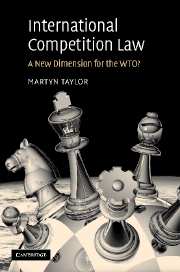Book contents
- Frontmatter
- Contents
- List of tables and figures
- List of abbreviations
- 1 Introduction
- PART I An International Competition Agreement is Desirable
- 2 Is competition law beneficial?
- 3 Is an international competition agreement desirable?
- 4 Is there a sufficient basis for an international competition agreement?
- 5 Have existing cross-border initiatives proved sufficient?
- PART II The WTO Would Provide a Suitable Institutional Vehicle
- PART III The Optimal Form for a WTO Competition Agreement
- APPENDIX: Draft negotiating text for a plurilateral WTO competition agreement
- Index
2 - Is competition law beneficial?
Published online by Cambridge University Press: 17 July 2009
- Frontmatter
- Contents
- List of tables and figures
- List of abbreviations
- 1 Introduction
- PART I An International Competition Agreement is Desirable
- 2 Is competition law beneficial?
- 3 Is an international competition agreement desirable?
- 4 Is there a sufficient basis for an international competition agreement?
- 5 Have existing cross-border initiatives proved sufficient?
- PART II The WTO Would Provide a Suitable Institutional Vehicle
- PART III The Optimal Form for a WTO Competition Agreement
- APPENDIX: Draft negotiating text for a plurilateral WTO competition agreement
- Index
Summary
Of all human powers operating on the affairs of mankind, none is greater than that of competition.
(Henry Clay, 1832)Part I of this book establishes that an international competition agreement is desirable.
An important first step in analysing the desirability of an international competition agreement is to determine the extent to which competition law is beneficial. While it is widely assumed that competition law is beneficial, the precise causal reasons why (and the magnitude of those benefits) are not widely understood. This chapter addresses these issues in the following manner:
Section 2.1 examines the theoretical rationale, modus operandi and philosophy underlying modern competition law. Modern competition law is principally concerned with economic goals, namely promoting the efficient operation of markets in order to maximise social welfare. Section 2.1 concludes that the welfare benefits of competition law are significant.
Section 2.2 identifies that the efficiency objective of competition law may be complemented by distributional objectives. Such distributional objectives are controversial. Modern competition laws often attempt to reconcile inherent tensions between the objectives of economic efficiency and distributional fairness.
Section 2.3 examines the relationship between competition law and other economic policies. Competition law is the principal instrument of competition policy and creates an environment conducive to sectoral deregulation. Section 2.3 identifies that such deregulation itself has a significant impact on economic welfare.
Chapter 2 confirms that competition law has a significant positive effect on economic welfare. Competition law deters anti-competitive conduct that may otherwise result in welfare losses to society.
- Type
- Chapter
- Information
- International Competition LawA New Dimension for the WTO?, pp. 7 - 33Publisher: Cambridge University PressPrint publication year: 2006



